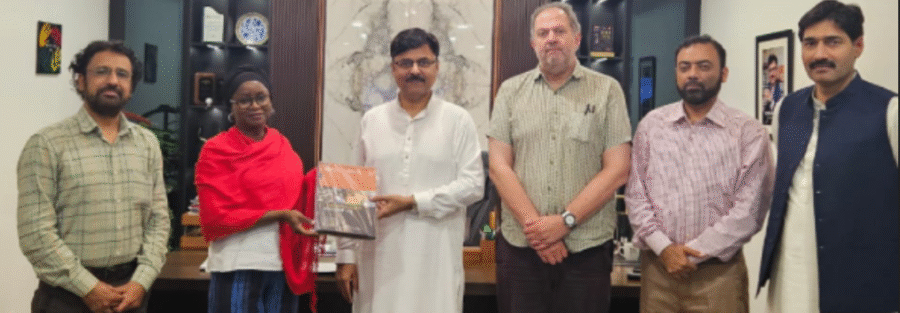📅 18th July 2025
📍 Delegation Visit – Food and Agriculture Organization (FAO), United Nations
The All Pakistan Meat Exporters & Processors Association (APMEPA) was privileged to host a high-profile delegation from the Food and Agriculture Organization (FAO) of the United Nations at the office of Mr. Syed Hasan Raza, Senior Vice Chairman of APMEPA.
FAO Delegation Members:
- Mr. Martin Rose – Consultant, FAO
- Miss. Oumou Barry – Consultant, FAO
- Mr. Dr. Zaffar Mehmood – Food Safety Specialist, FAO
- Mr. Ghulam Mustafa – Consultant, FAO
The delegation was warmly welcomed by Mr. Syed Hasan Raza and his team, who engaged in an in-depth discussion on the current landscape of Pakistan’s meat industry. The meeting revolved around identifying core challenges, exploring growth opportunities, and seeking collaborative solutions for sustainable development.
Key Discussion Points:
- Price De-Capping of Milk
Removing artificial price caps on milk is essential to ensure fair returns for dairy farmers and encourage quality-driven production.
Price de-capping will promote investment in modern dairy practices, leading to better milk hygiene, yield, and supply chain efficiency.
A free-market pricing mechanism will stabilize the sector, benefiting both producers and consumers in the long run.
- Pakistan’s Indigenous Index for Standardization of Meat and Livestock
To enhance quality assurance and global competitiveness, Pakistan must develop its own comprehensive index for the standardization of meat and live animals. This localized index will define clear grading parameters for animal health, carcass quality, and meat hygiene, aligned with international benchmarks yet tailored to Pakistan’s unique livestock sector. Establishing a national standard will foster credibility in export markets, streamline certifications, and ensure uniform practices across the meat industry.
- Introduction of Beef Breeds in Pakistan
Introducing specialized beef breeds in Pakistan is essential to boost meat yield, feed efficiency, and carcass quality. Focused breeding programs will enhance genetic potential, ensuring higher productivity per animal compared to traditional desi breeds. This shift will strengthen Pakistan’s position in premium meat exports and meet rising domestic demand for quality beef.
- Establishment of Disease-Free Compartments (DFCs)
Creating Disease-Free Compartments (DFCs) in Pakistan is vital to meet international sanitary and phytosanitary (SPS) standards for meat exports. DFCs will ensure controlled biosecurity zones, free from transboundary animal diseases, boosting global market access. This strategic initiative will enhance Pakistan’s credibility as a reliable supplier of safe and certified meat products.
- Capacity Building:
The lack of skilled manpower trained in modern meat processing and hygiene protocols was identified as a critical bottleneck.
- Regulatory & Compliance Barriers
Mr. Raza highlighted the pressing need for harmonizing Pakistan’s food safety regulations with international SPS standards, particularly for accessing premium markets like the EU, GCC, and Far East.
- Infrastructure Gaps
Limitations in laboratory testing facilities, cold chain logistics, and were discussed as major hindrances to industry competitiveness.
Strategic Recommendations Presented:
- Establishing a National Residue Monitoring Plan (NRMP) for meat products.
- Launching traceability frameworks supported by digital platforms.
- Initiating farmer-level awareness programs on animal health, welfare, and export-compliant practices.
What Needs to be Done by the Government of Pakistan?
For Pakistan to realize its full potential as a global halal meat hub, it is imperative that the government takes decisive actions, including:
- Policy Reforms: Formulating a comprehensive National Meat Export Policy focused on compliance, competitiveness, and sustainability.
- Investment in Infrastructure: Facilitating the development of certified abattoirs, laboratory networks, and cold chain logistics through public-private initiatives.
- Capacity Development Programs: Launching technical training schemes for butchers, processors, and food safety professionals in line with international standards.
- Simplifying Export Procedures: Streamlining certification processes through digitalization and reducing bureaucratic hurdles for exporters.
Support Required from FAO (United Nations)
The role of FAO is pivotal in supporting Pakistan’s meat sector through:
- Technical Assistance: Assisting in the development of traceability and food safety frameworks that align with global best practices.
- Funding Support for Pilot Projects: Partnering with APMEPA for pilot initiatives aimed at capacity building and infrastructure enhancement.
- Policy Advisory: Collaborating with the government to align national strategies with international trade requirements.
- Certification & Accreditation Programs: Facilitating global recognition of Pakistan’s meat industry certifications to ease market entry barriers.
The Way Forward
The meeting concluded with a mutual commitment towards continuous dialogue and collaboration. APMEPA deeply values the FAO’s proactive engagement and envisions this partnership as a cornerstone for Pakistan’s emergence as a leading exporter of high-quality halal meat.
We extend our sincere gratitude to the FAO delegation for their invaluable insights and look forward to translating these discussions into actionable projects that will benefit the entire industry.



